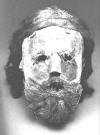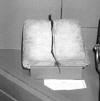|
Rev. Alexander
Peden,
Alexander
Peden was born about 1626 in the house of Auchincloich in the
northern part of the Parish of Sorn, Ayrshire. He was the eldest
son and heir to his father a small proprietor of land who by
the standards of the day was quite well off. Thus the young
Alexander received a good education – a scholar of the
University of Glasgow, and mixed freely among the gentlemen of
the county which included the Boswell family of Auchinleck. But
despite these advantages he chose a lifetime of loneliness and
poverty.
For a
while Peden was a teacher in Tarbolton during which time he
was falsely accused of wronging a woman. He was at risk of
being excommunicated when evidence was produced of his innocence
but the experience left a scar and may well be the reason why
he never married. Peden`s next step was , in 1659, to seek
ordination into the church and no less than five times appeared
before the Presbytery of Lanark and Biggar before his licence
was granted. He was ordained and appointed to the parish of New
Luce in Galloway but his stay was brief as in 1663 along with
so many other ministers, he was compelled to leave the church.
Thus began twenty three years of wandering the hills and moors
of South West Scotland from the Clyde, through Renfrewshire, his
homeland of Ayrshire into the depths of Dumfries and Galloway ,
and across the Irish Sea in Ulster where he preached at Kells
and Glenwherry, Co Antrim between 1679 and 1681 and made later
visits in 1682 and 1684.
He was
undoubtedly a gifted preacher and would present
his sermon in homely
ways, that the populace could understand. His manner of
delivering a sermon with the occasional halt and aside discussion
with an unseen third party , or an apparent conversation aside
with God, added to his reputation. A vivid speaker he was
credited with almost supernatural powers because he almost
routinely escaped the soldiers seeking him out. Not only did he
escape pursuers many times but it was on occasion because of
swirling mists and sudden severe weather cloaking him from the
dragoons, thus adding to his mystique. A shrewd assessor of his
fellow man and the issues that beset the Covenanters gave
meaning to his reputation as a prophet although his forecasts
were more likely the result of keen observation of
men, politics and a wisdom garnered over many years of strife. Among his
prophesies were that at Rullion Green and Bothwell Brig “ the
saints will be broken, killed, taken and fled “
A well
known prophecy of Peden`s concerned
John Brown, known as “The
Christian Carrier “ who on 1 May 1685 refused to take the
Abjuration Oath, and a search of his home revealed treasonable
papers and weapons. He was condemned on the spot by Claverhouse
and shot in front of his wife, Isabel
Weir, and children fulfilling a
prophecy that Peden had made in 1682 when he had married them.
At that time he said:
“You
have a good man to be your husband , but you will not enjoy him
long; prize his company, and keep linen by you to be his winding sheet,
for you will need it when ye are not looking for it, and it will be a
bloody one “
The tale
is told of a trip to Ulster and County Antrim in 1682 where he
took work threshing corn for local farmer William Stiel at
Glenwherry, thereby gaining a modest wage, a
bed in the barn but also time to
think and pray. However, a servant told
of his praying and he was obliged to reveal his identity only
to be received into the house as an honoured guest by the farmer
and his family. On another occasion he displayed a brave
recklessness by escaping from pursuing dragoons by plunging into
an icy river in spate, leaving the pursuers on the far shore
afraid to take the plunge. In yet another incident he and his
party were chased by dragoons when , it is said, Peden
prayed for help and a thick mist
descended under cover of which they
escaped
Howie,
in Scots Worthies describes the event thus:
“Let us pray here , for if the Lord hear not our prayers and save us , we
are all dead men…. “Lord it is Thy enemy`s day, hour and power;they may
not be idle. But hast Thou no other work for them but to send them after
us ? Send them after them to whom Thou wiltt give strength to flee,
for our strength is gone. Twine them about the hill, Lord, and cast
the lap of Thy cloak over Old Sandy, and thir poor things, and save us
this one time; and we`ll keep it in remembrance, and tell it to the
commendation of Thy goodness, pity and compassion, what Thou didst for us
at such a time.”
 Whether Whether
Divine Providence or not, tales such as these soon became lore
and gained for Peden a reputation which of itself concerned the
authorities who feared the power and influence he exercised. This
was enhanced by the fact that Peden often used a curious mask
to disguise himself in his travels during The Killing Time. Very
crude by  today`s standards the mask is made of leather, with today`s standards the mask is made of leather, with
real teeth fixed in the mouth and human hair attached to the
forehead but in the days of flickering lamps and candles it
must have served its purpose. The mask is today in the National
Museum of Scotland , Edinburgh, as is Peden`s well thumbed
Bible.
He was
not directly involved in the Pentland Rising in 1666 but good
fortune ran out in June 1673 when he was captured while holding
a conventicle at Knockdow, near Ballantrae in South Ayrshire. He
was brought before the Privy Council and sentenced to imprisonment
on the Bass Rock where he was held for four years and three
months – until
 October 1677. From the Bass Rock he was moved to October 1677. From the Bass Rock he was moved to
the Tolbooth in Edinburgh where he spent another eighteen months.
In December 1678 he, with sixty seven others, was sentenced to
banishment and put on board the “St Michael “ to be taken to
Virginia. This scene of another glimpse into the future, when Peden prayed on behalf of a fellow deportee James Law
“ lord,
let not James Law`s wife miss her husband, until thou return him
to her in peace and safety, which we are sure will be sooner than
either he or she is looking for.”
On board ship Peden
also reassured his fellows that
“
If we were once in London we will all be set
at liberty “
In
the event,
the ship was delayed five days and when it put into London there
was nobody to receive them. The captain who was to
take them to Virginia refused to take them when he found out
that they were good Christians, and not the thieves and
vagabonds he had believed were to be transported. At this the
captain of the St Michael declined to provision his sixty prisoners, and
put them ashore. Thus freed they were treated well by the people
of Gravesend and most of the prisoners made their way back to
Scotland; and fulfilling yet another Peden prophesy .
Peden
returned to Scotland where for the next seven years he divided
his time between Scotland and Ulster going as he called it “ from
one bloody land to the other bloody land“ He returned for the
last time in February 1685. Peden was not in fact a Cameronian
although he was as severe a critic as any of the government
and prelacy , and supported the Duke of Argyll`s rebellion to
remove a Popish king from the throne. For many years he and
James Renwick, the leader of the
Cameronians after the death of Richard Cameron at Ayrsmoss, held each other in respect
even though of differing opinions on some matters, and were
reconciled as Peden lay upon his death bed.
The end
came for Peden on 26 January 1686 after he had returned to his
brother`s home at Ten Shilling Side, Auchinleck.. There was a
concealed cave nearby to which Peden would retire at night. Two
days before he died he left the cave and went to his brother`s
house where his sister in law remonstrated with him insisting
that he return to the safety of the cave. Peden refused saying
“
I have done with that for it is
discovered. But there is no matter , for within forty eight hours I
will be beyond the reach of all the devils` temptations and
his instruments in hell and on earth, and they shall trouble me no
more. “
Within
three hours the troopers came and found the cave but not Peden
who hid in a pile of straw. After the soldiers had gone away Peden
told his friends to bury him where they would,
and prophesied he would be lifted
again; within in a few hours he died.
As he had
foretold, there was no peace for him in death as the government
continued to hound him. The Boswell family were so concerned
for his body that they had it re interred secretly in their
family vault. But some forty days after he had died, and despite
protests of the Boswell family and the Countess of Dumfries,
soldiers took the body to the place of execution, a hill above
Cumnock , and hung it on the gibbet. When it was eventually cut
down the body was buried again, this time at the foot of the
gibbet as if a common criminal. Time has been a great healer
for little by little the local people buried their loved ones
alongside Alexander Peden thus creating a new and hallowed
graveyard.
In 1891 a
monument paid for by public subscription was erected with the
following inscription
In Memory
of
ALEXANDER
PEDEN
[ A native of
Sorn ]
THAT
FAITHFUL MINISTER OF CHRIST,WHO.
FOR HIS
UNFLINCHING ADHERENCE TO THE
COVENANTED
REFORMATION IN SCOTLAND,WAS
EXPELLED BY
TYRANT RULERS FROM HIS PARISH
OF NEW
LUCE,IMPRISONED FOR YEARS ON THE
BASS ROCK BY
HIS PERSECUTORS,AND HUNTED
FOR HIS LIFE
ON THE SURROUNDING MOUNTAINS
AND MOORS,
TILL HIS DEATH ON 26TH JANUARY 1686
IN THE 60TH
YEAR OF HIS AGE, AND HERE
AT LAST , HIS
DUST REPOSES IN PEACE,AWAITING
THE
RESURRECTION OF THE JUST
SUCH WERE THE
MEN THESE HILLS WHO TRODE
STRONG IN THE
LOVE AND FEAR OF GOD
DEFYING
THROUGH THE LONG DARK HOUR,
ALIKE THE
CRAFT AND RAGE OF POWER.
ERECTED
IN
1891.
Peden at the Grave of
Cameron ( Mrs A Stuart Menteath)
|